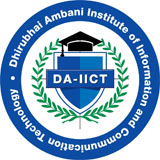NEP 2020
The National Education Policy (NEP) is a visionary framework designed to transform education by making it more inclusive, holistic, and future-ready. Our platform is dedicated to facilitating the seamless implementation of NEP, ensuring that its key principles—equity, flexibility, skill-based learning, and multidisciplinary education—are effectively integrated across all levels of education. Dhirubhai Ambani Univeristy (DAU-formerly known as DA-IICT) has taken multiple initiatives towards the implementation of the National Education Policy (NEP) 2020. University Grants Commission (UGC) has divided the policy into ten broad thrust areas to support the implementation of NEP-2020 at ground level.
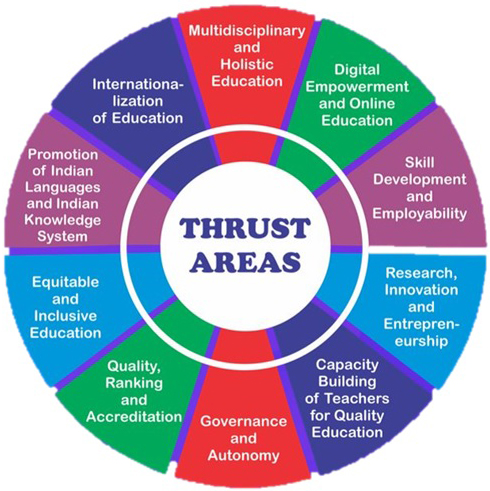
Explore our platform to stay informed, participate in discussions, and contribute to shaping the future of education in alignment with the NEP!
- Multidisciplinary Holistic Education
- Digital Empowerment
- Skill Development and Employability
- Research Innovation and Entrepreneurship
- Capacity Building of Teachers for Quality Education
- Governance and Autonomy
- Accreditation and Excellence
- Equitable and Inclusive Education
- Indian Knowledge System
- Internationalization
Multidisciplinary Holistic Education
Multidisciplinary Nature
DA-IICT has been transformed from an ICT institute to a multidisciplinary university DAU. DAU will house multiple higher education institutions across different disciplines technology, law, design, management, etc.
DAU has 5 multi-disciplinary 4 years UG degree programmes.
- B.Tech in Information and Communications Technology (ICT) – Convergence of computer and communication system
- B.Tech (Honors) in ICT with minor Computational Science
- B.Tech. (Honours) in ICT with Minor in Robotics and Autonomous Systems
- B.Tech in Mathematics and Computing (MnC) -fusion of Mathematics and Computer Science
- B.Tech in Electronics and VLSI Design (EVD) - industry ready UG manpower for VLSI industries
DAU has 5 multi-disciplinary PG degree programmes
- M.Tech. in ICT (Machine Learning, Software Systems, VLSI and Embedded Systems, Wireless Communication and Signal Processing)
- M.Sc. in Agriculture-Analytics (in collaboration with IIRS Dehradun, and Anand Agricultural University)
- M.Sc. in Information Technology (IT)
- M.Sc. in Data Science
- M.Des. in Communication Design
Course Baskets
Different course baskets have been prepared to align with NEP.
- Major (foundation core—set of compulsory courses taken by every student during the initial semesters)
- Minor (currently two minor streams are available: computational science and Robotics and autonomous systems)
- Multidisciplinary (Humanities and Social Sciences, Open Electives - Courses offered as core as well electives)
- Ability Enhancement (core/ elective courses on language, writing and communication skills)
- Skill enhancement (Programming courses, hands-on lab oriented core courses)
- Value-added courses (delivered by industry experts and subject experts).
Curriculum
Redesign of course curriculum in alignment with NEP 2020 as part of the Curriculum Review Process. Curriculum Review Committees looked at the broader guidelines coming from the National Education Policy (NEP 2020) while designing the new curriculum of our existing UG/PG programs. The curriculum revision has enabled accommodating minor stream such as Robotics and Autonomous Systems. It also includes skill-based courses like exploratory project. Most of the UG programmes follow NCrF, a few programmes are being revised to align with NCrF.
The new curriculum includes experiential learning and extra and co-curricular activities. The rural internship and exploration projects are part of experiential learning. The students develop extracurricular and co-curricular activities that complement academic learning by developing well-rounded individuals with essential life skills. They prepare students for real-world challenges, making them adaptable, confident, and capable professionals and citizens.
Highlights of the New Curriculum:
- Experiential Learning
×
Experiential Learning
- Rural Internship - The rural internship is designed to expose the student to the social and economic realities of rural India, thereby, providing an opportunity to identify ways of improving the quality of rural life - doing it differently, systematically, using technology, including ICT. The duration of the rural internship is 4 weeks and is carried out in the Winter break after the third semester with an NGO and Govt. organizations.
- Exploration projects - These projects allow students to explore their surroundings to identify interesting problems that admit a design based and/or hardware based solution and make such a product by leveraging the introduction to ICT skills learnt in the first semester. Students are expected to work in groups of 8 to 10 under a faculty mentor over two semesters - second and third semester.
- Social and Emotional Learning (SEL)
×
Social and Emotional Learning (SEL)
- Teamwork & Collaboration → Group activities like sports, drama, and debate teach students how to work together.
- Leadership Skills → Roles such as team captain, student council member, or club leader develop decision-making and responsibility.
- Empathy & Communication → Interacting with peers from diverse backgrounds fosters emotional intelligence and better interpersonal skills.
- Resilience & Adaptability → Facing challenges in competitions or performances builds perseverance and coping mechanisms.
- Cognitive and Critical Thinking Skills
×
Cognitive and Critical Thinking Skills
- Problem-Solving → Activities like chess, coding clubs, or science fairs encourage analytical thinking and innovative solutions.
- Creativity & Innovation → Arts, music, and drama stimulate imagination and original thinking.
- Decision-Making → Participating in debates, or student-run initiatives enhances the ability to make informed choices.
- Practical and Life Skills
×
Practical and Life Skills
- Time Management → Balancing academics with activities teaches students how to prioritize and organize effectively.
- Self-Discipline & Responsibility → Maintaining commitments to clubs, sports, or volunteer work builds accountability.
- Networking & Relationship Building → Engaging with mentors, peers, and professionals in various fields expand social networks.
- Public Speaking & Communication → Performing on stage, giving presentations, or engaging in discussions improves articulation and confidence.
- Physical and Mental Well-Being
×
Physical and Mental Well-Being
- Physical Fitness & Health Awareness → Sports, yoga, and outdoor activities promote an active lifestyle.
- Stress Relief & Emotional Well-being → Creative arts, music serve as outlets for relaxation and self-expression.
- Leadership and Entrepreneurial Skills
×
Leadership and Entrepreneurial Skills
- Event Planning & Organization → Managing events, fundraisers, or club activities builds planning and execution skills.
- Financial Literacy → Managing budgets for clubs, fundraising events, or business clubs introduces financial decision-making
- Entrepreneurial Thinking → Initiatives like student-run businesses, innovation challenges, or hackathons foster an entrepreneurial mindset.
Most of the skills are developed through active participations in various student-driven clubs like
- Electronic hobby club
- AI Club
- Press Club
- Debate Club
- Dance Club
- Music Club
- Research Club
- Chess Club
- Photography and Movie Making Club
- Programming club
- Theater club
Academic Bank of Credits
- DA-IICT has registered on ABC (NAD) portal vide registration No. NAD003426
- Uploaded Degree Certificates-5010 (Convocation Year 2014-2024)
- Uploaded Grade Sheets: 2621 (UG and PG: 2021-2023)
- Students have been oriented to create ABC IDs and the benefits of academic bank.
Digital Empowerment
- Necessary digital infrastructure such as high speed internet, digital writing pads, camera, microphone, recording studio, etc. are available.
- Faculties use learning management system such as Moodle, Google Classroom for posting different materials, quizzes, assignments, etc.
- Faculty members use to conduct different courses for continuing education programme and anchor institute programme in online mode.
- UG, PG students of a few programmes are allowed to take MOOC courses to fulfil their credit requirement in elective courses.
Skill Development and Employability
Internship Embedded Degree Programme
- All the UG and PG programmes have internship component
- There are different categories of internship for UG students
- Rural Internship (between semesters III and IV): students go to NGOs at rural level and work there for 3 weeks to get an understanding about the grassroots level problems existing in our country and help in solving them.
- Summer Research Internship (2 months after semester VI)
- Industrial training project (4 months-semester VIII)
- At semester VIII of UG, and semester IV of PG students can opt for either research project with a faculty member of the institute or can go for industrial training project or industrial internship.
- Industrial internship is facilitated by the placement office.
Industry Institute Linkage
- Several MoUs have been signed with industries to develop academic and industry co-operation in research and development.
- Organized a few events jointly with industries.
- Appointed professor of practice with industry experiences.
- The value added courses of UG, PG programmes are mostly offered by industries.
Research Innovation and Entrepreneurship
DAU has dedicated research office, headed by Dean of Research. The Office of Dean (Research) implements policies and procedures relating to the following matters:
- Carrying out /monitoring any sponsored project, consultancy project, including manpower requirement;
- Submission of project proposals to the funding agencies
The research office oversees organization and /or participation by faculty and research scholars in workshops, seminars and conferences. It creates awareness of funding opportunities through Institute’s Research Promotion Committee. The R&D office promotes Entrepreneurship and Innovation through DA-IICT Center for Entrepreneurship and Incubation (DCEI).
Inter-disciplinary research areas
- AI,ML, Data Science
- Algorithms and Theory of Computation
- Communication and Signal Processing
- Humanities, Social Sciences and Design
- Physics and Mathematical Sciences
- Software Systems and Networking
- VLSI and Embedded System
Dedicated Research Labs
- Microtronics Lab
- Ubisense Lab
- Smart City Lab
- DIDM Lab
- Communication and Signal Processing Lab
- Speech Signal Processing Lab
- Wireless Communication Research Lab
- Computational Science and HPC Lab
- Information Retrieval & Language Processing Lab
- Software Engineering Research Lab
Research Supports and Incentives
- CPDA: DAU supports faculty members for participating national/international conferences and workshops by providing a Cumulative Professional Development Allowance of Rs. 3 lakhs for every block of three years on reimbursement basis.
- Seed Grant: For new faculty, a seed grant of up to Rs. 10 lakhs is granted on approval of the proposal by Dean (Research) through the Institute’s Research Promotion Committee.
- Faculty Research Incentive: Financial incentive up to 1 lakh per top quality publication and recognition
- Student Research Excellence Award: The award (a certificate plaque/medal and a cash prize of Rs. 5000) is presented by the Director annually to the students who have published in top quality journals/conferences.
- Support for the Doctoral Students: Up to Rs.1.5 lakh for presenting a paper abroad, and up to Rs. 50K for presenting a paper within India
Capacity Building of Teachers for Quality Education
DAU offers courses under continuing education program (CEP) and anchor institute program (AIP) with close collaboration with Center for Entrepreneurship Development (CED). Established a dedicated office for CEP and AIP with 5 faculty members and a secretary. Under the umbrella of these programs, we offer various courses to train the faculty members of other institutes. Some of the topics are Operating Systems, Digital and Analog Communication Systems, Image Processing using VLSI Architectures, Multicore Processor Architecture and parallel Programming, Data Structures, Software Engineering, Programming, .Net and C#, Real-time and Embedded Systems, and others. Faculty members are also encouraged to attend faculty development programs.
Governance and Autonomy
Institutional Development Plan:
DAU has created a vision, mission and strategic plan for institute’s development by focusing on
- Research
- Innovation and Entrepreneurship
- Outreach
- Recruiting quality faculty and researchers
- Growth infrastructure
- Resource centre
- Digital campus
- Changes in governance
- Students’ welfare
Grievance Redressal:
DAU has established a grievance redressal cell for students and employees. Grievance Redressal Handling Committee (GRHC) is the main pillar of the cell. GRHC consists of five senior faculty members and a secretary. The chairperson of the committee is a female senior professor. If the student's grievance is not resolved/addressed by the GRHC, the student may raise her/his concern with full details of the complaints to the Ombudsperson.
Accreditation and Excellence
- NAAC-A+ (Score 3.32): 07/09/2023
- Participate in NIRF ranking every year
- We are among the top 5 institution in India in terms of graduation outcome.
- Indian Institutional Ranking Framework (IIRF)-2023: Rank 1 under the category of “State-Private Universities”
- GSIRF Five Star Institution in the category of Universities in 2023 and 2024
- Institute is awarded the status of Centre of Excellence (COE) by the GoG.
Equitable and Inclusive Education
Gender Parity
- In-campus hostel accommodation is provided to all the female students with basic facilities and amenities. The women hostels are secured with female security personnel.
- Internal complaints committee (ICC) has been constituted to look into different kind of harassments as per the legal requirements in the Sexual Harassment of Women at Workplace (Prevention, Prohibition and Redressal) Act, 2013.
- ICC uses to organize gender sensitization events regularly to sensitize faculty, staffs, and students.
Inclusion of SEDGs
- Scholarships for economically disadvantaged groups
- DA-IICT merit-cum-mean scholarship (full tuition fee; up to 15 students with good merit; family income< 6 lakh/annum)
- UG/PG Cybage Khusboo Scholarships (5 students per year; 80% of the tuition fee)
- Jai Jhulelal Scholarships for B.Tech students (4 students per year; 25% of the tution fee)
- The Satnaam WaheGuruji Scholarships for B.Tech students (4 students per year; 25% of the tuition fee)
- Special assistances are offered during examinations to the specially-abled students.
- Lecture theatres and lab building is wheelchair accessible.
Global Citizenship Education
- Courses on Global Systems: Modern European Philosophy, International Economics, Publics in South Asia: Contemporary Perspectives
- Courses on Cultural Diversity: Ethnography and Applications
- Courses on Environment: Environmental Science and Environmental Studies
Apart from the mentioned courses students are exposed to different types of courses to improve their problem solving skills, critical thinking, creativity, communication skills, etc.
Indian Knowledge System
DAU offers several courses for the students in the theme of Indian Knowledge System. A few examples are:
- Approaches to Indian Society
- Indian Society and Governance
- North Indian Classical Music
- Idea of India
- Indian Cinema: Lineages and the Present
- Indian Diaspora and Transnationalism: An Introduction
- Technology and the Making of Modern India
- Approaches to Culture and Communication
Apart from these courses, DAU is involved in creating IKS course on History in consultation with Knowledge Consortium of Gujarat (KCG). The course will be developed with a focus on the outcome-based educational model, which will enhance the study and research capabilities of the students by integrating the traditional knowledge of India with modern educational structures.
IKS Coordinator: Dr. Purbasha Das
Contact: iks[at]dau[dot]ac[dot]in
Internationalization
Collaboration with Foreign HEIs
DAU has several collaborations with foreign HEIs for teaching, research, students and faculty exchange. Some of them are:
- Universiti Teknologi Mara, Malaysia
- University of Evora (Universidade de Evora), Portugal
- University of Hildesheim (Stiftung Unversitat Hildesheim), Hildesheim, Germany
- University of Swaziland (UoS), Swaziland
- Institut Superieur D’Electronique De Paris, France
- University of Antwerp, Belgium
- University of Rennes, France
- University of Dayton, USA
- Oregon University, USA
- Texas A & M, USA
- Univeristy of Milano-Bicocca, Italy
- The University of Auckland, New Zealand
Efforts in Internationalization of Education
- DAU has formed a dedicated office for international affairs.
- A few joint research projects with foreign HEIs are currently going on.
- Faculty members are involved in publishing research papers in collaboration with foreign HEIs.
- Faculties and doctoral students are encouraged to attend international conferences/workshops by providing financial assistance.
- DAU hosts a few international visiting faculty members.
Alumni Connect
DAU has a dedicated alumni office, headed by the Dean (Alumni & external Relations). The office invites alumni in different technical/cultural events. It conducts regular alumni meet. Alumni are connected via Alma Connect portal. For better connection, the Alumni office has started issuing alumni card. DA-IICT has a registered alumni association (GUJ/2747/GANDHINAGAR (Dated:29/12/2017).
People
-
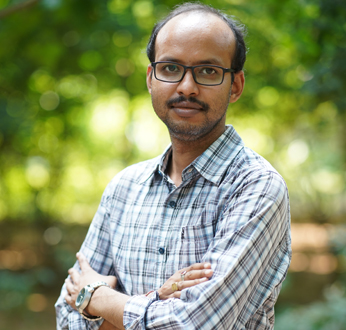
Srimanta Mandal
(NEP Coordinator) -
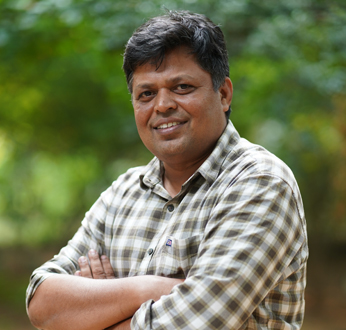
Mukesh Tiwari
(IQAC Director) -

Purbasha Das
(IKS Coordinator) -
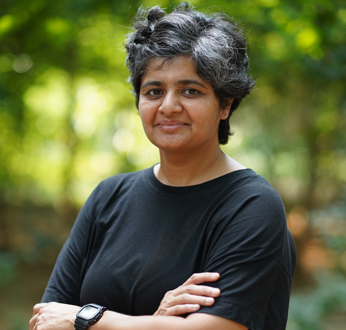
Amishal Modi
(UBA Coordinator) -

Jigar Yagnik
(ABC/NAD Nodal Officer, CoE-DAU) -

Jalpesh Pandya
(Deputy Registrar - Academic) -
Ayushi Sharma
(Student Ambassador) -
Sneh Rawal
(Student Ambassador) -

Dhruv Shah
(Student Ambassador)
- “Academic Bank of Credits" means an academic service mechanism as a digital/virtual/online entity established by University Grants Commission to facilitate students to become its academic accounts holder, thereby paving the way for seamless students’ mobility between or within degree granting HEIs through a formal systems of credit recognition, credit accumulation, credit transfer and credit redemption to promote distributed and flexible teaching learning.
- ABC is a bank for academic purposes on the pattern of commercial banks for financial purposes with students as academic account holders to whom ABC shall provide a variety of services including credit verification, credit accumulation, credit transfer or redemption and authentication of academic awards.
- The Procedure of Registration in Academic Bank of Credits is explained below:
- Visit https://www.abc.gov.in/
- Click on My Account => Student
- If you already have a digilocker account, sign in using mobile/user name and PIN.
- For new user, click https://digilocker.meripehchaan.gov.in/signup/
- Enter mobile number, and click “Generate OTP”. Submit the OTP and click on Verify.
- Fill all necessary details and then click on Verify.
- You will get your ABC ID. Get these details for college & university records when required.
Watch the help video by clicking here
- The DA-IICT has registered on ABC (NAD) portal vide registration No. NAD003426
NAD/ABC Cell at DAIICT:
| 1. | Jigar Yagnik Deputy Registrar (Academic) and Controller of Examination (Nodal Officer) |
| 2. | Dinesh Prajapati Jt. Controller of Examination |
| 3. | Jainik Patel Academic Assistant |
Contact ABC Cell: coe_office[at]dau[dot]ac[dot]in
Mahatma Gandhi’s vision in Hind Swaraj critiques the Western model of centralized development, linking it to rising inequality, crime, and environmental degradation. He advocated for self-sufficient "village republics" that utilize local resources and decentralized, eco-friendly technologies to meet essential needs. This vision is crucial for India, where 70% of the population resides in rural areas, yet agriculture, employing 51% of the workforce, contributes only 17% to GDP. Persistent rural-urban disparities in health, education, and employment drive migration to cities, making sustainable rural development essential. The Unnat Bharat Abhiyan (UBA) aims to address these challenges by integrating higher education institutions into rural development efforts.
Under the Unnat Bharat Abhiyan (UBA) scheme of UGC, DAU has identified five villages to engage the faculty and students of Higher Educational Institutions in understanding rural realities. The objective is to identify & select existing innovative technologies, enable customisation of technologies, or devise implementation methods for innovative solutions, as per the local needs. It shall help to leverage the knowledge base of the educational institutions for effective implementation of various government programmes.
| S. No. | Name of Village | Block Name | Panchayat Name | District |
|---|---|---|---|---|
| 1 | Dantali | Gandhinagar | Dantali | Gandhinagar |
| 2 | Tarapur (Og) | Gandhinagar | Tarapur | Gandhinagar |
| 3 | Pirojpur | Gandhinagar | Pirojpur | Gandhinagar |
| 4 | Prantiya | Gandhinagar | Prantiya | Gandhinagar |
| 5 | Mahudara | Gandhinagar | Mahudara | Gandhinagar |
UBA Team:
- Dr. Amishal Modi (Coordinator)
- Dr. Yash Agarwal (Associate Professor)
- Dr. Ratna Bharati Bhamidipati (Assistant Professor)
- Dr. Purbasha Das (Assistant Professor)
Contact
Email: nep_coordinator[at]dau[dot]ac[dot]in
